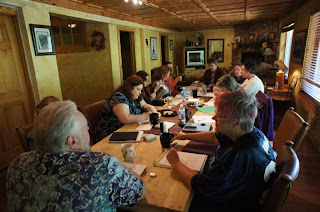But the overwhelming cascade of seasonal adornments pales before what is to come. The pinnacle of decoration is to build our holiday tree. We first place the bare tree in its place of honor, then bring the storage boxes from the attic and begin to adorn the branches with large and small decorations both bright and gaudy.
Decorating the tree is a process without a distinct objective. There is no specific plan to be followed, but rather a successive layering of artifacts. The ornaments are an eclectic collection of cheap jewelry, small treasures, expensive glassware, artfully crafted metal and wood creatures, and religious items from a half dozen cultures, all collected over our years from places we've either lived or travelled First the lights are tested, then strung in a rough pattern to ensure that the tree has no places lacking colored illumination. Small and large balls are hung wherever there seems to be an empty branch. This is easy at first but becomes increasingly challenging as the festooning progresses. When the entire store of balls is exhausted we then place larger items among, between, next to, and behind the ornaments and earlier objects. That done, we affix strings of beads and ribbons, and drape colored cords in spirals around the tree. As a finishing touch, an old bedraggled and beloved angel acquired years before is affixed to the tree's peak where it leans leftward, as always.

After hours of work the tree has been transformed into a thing of unbelievable layered, multifaceted complexity. There are so many objects chock-a-block that it would be impossible to derive a unifying theme or even to see the tree beneath. Consequently, hardly anyone looks too closely, save to search for some favorite item. It is something to be admired as a whole.
So why, you may ask, do we take so much time each year to build this overwrought objet d'art? Why do we expend so much time administering to its details?
The answer to that question is not simple since the effort, the process of decorating the tree is a labor of love and remembrance. Every single item placed on the tree evokes a memory of the time and place it was acquired. Some items are treasured gifts from people we've known. The bright globes are from France, Germany, Italy, as well as the United States. The small golden owls are from a temple in Burma, the multicolored tassels from a market in Seoul, the glass spheres from a trip to Austria. Other decorations were from Spain, the Netherlands, England, and Scotland. We have small pottery animals from Japan, straw figures from Mexico, and garlands from all over. Each item has its tale, each its own memory of its place, and each is a marker in the history that we are writing with out lives each holiday season. The tree is a symbol of who we were and who we are, but that is not the reason for doing so much work in erecting it. That process, the decoration of the tree, is an annual celebration of seasons past and, if there is still an empty place we can find, a place for more to come.
So, in the end, each year's construction of the tree means much more than building a bright seasonal decoration. It is renewing and reliving a warm, glowing symbol of our family's history.



